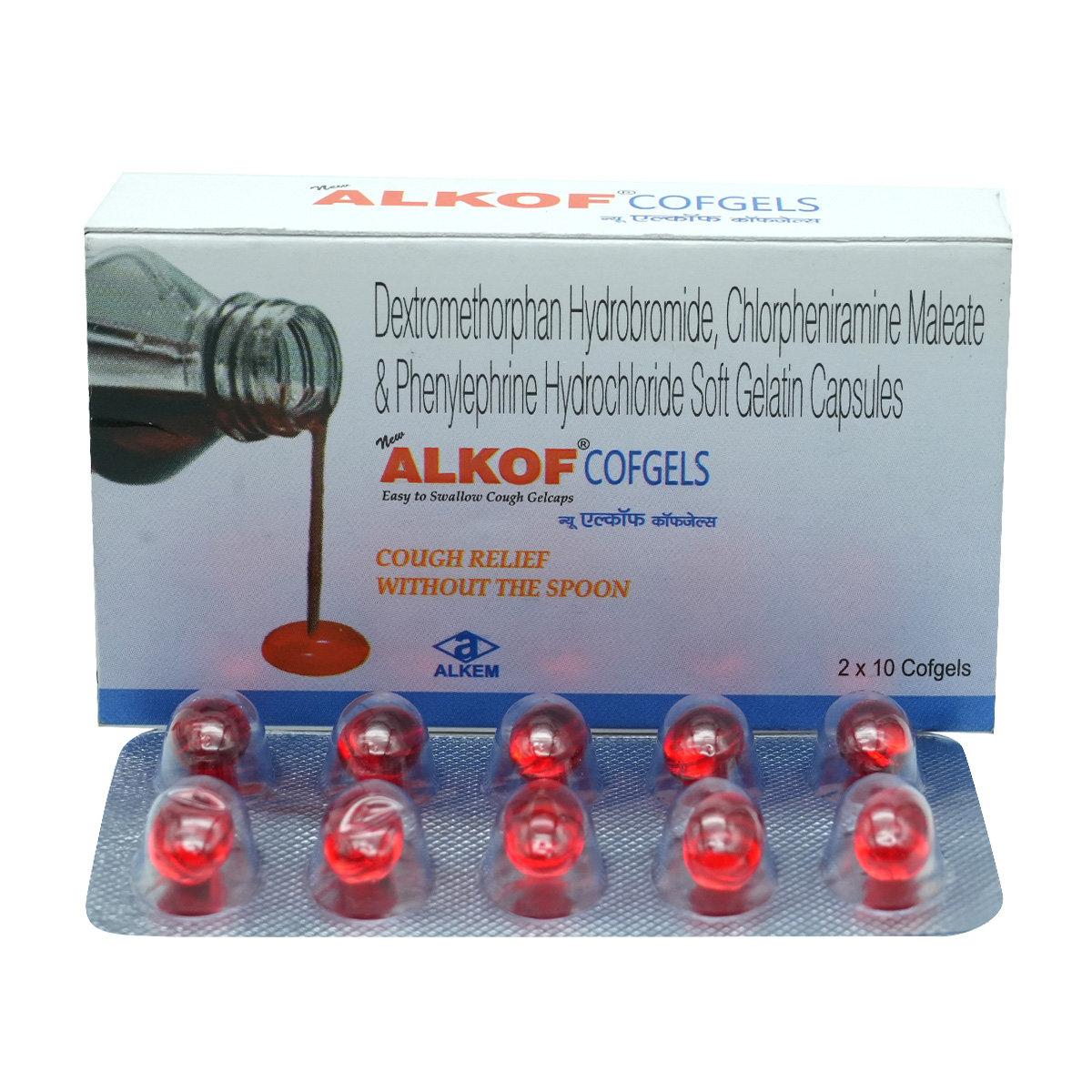Dextromethorphan Hydrobromide+bromhexine Hydrochloride+phenylephrine Hydrochloride
About Dextromethorphan Hydrobromide+bromhexine Hydrochloride+phenylephrine Hydrochloride
Dextromethorphan Hydrobromide+bromhexine Hydrochloride+phenylephrine Hydrochloride belongs to the class of medications called ‘Expectorant and Cough products,’ used to treat cough and nasal congestion caused by the common cold, flu, and allergies. A cough is a natural reflex that helps remove foreign irritants from the airways, such as allergens, mucus, dust, or smoke. Nasal congestion (stuffy nose) occurs when the nasal passages become blocked, obstructing airflow in and out of the nose.
Dextromethorphan Hydrobromide+bromhexine Hydrochloride+phenylephrine Hydrochloride contains three medications: Dextromethorphan Hydrobromide (a cough suppressant), Bromhexine Hydrochloride (a mucolytic agent), and Phenylephrine Hydrochloride (a nasal decongestant). Dextromethorphan Hydrobromide works by blocking the action of the cough centre in the brain, which is responsible for the cough reflex. Bromhexine Hydrochloride helps thin and loosen sputum (mucus/phlegm), making it easier to cough up. Phenylephrine Hydrochloride works by narrowing the blood vessels in the nasal passages, providing relief from congestion or stuffiness in the nose.
Your doctor will determine the dose and duration of Dextromethorphan Hydrobromide+bromhexine Hydrochloride+phenylephrine Hydrochloride based on your child's medical condition. In some cases, Dextromethorphan Hydrobromide+bromhexine Hydrochloride+phenylephrine Hydrochloride may cause common side effects, such as nausea, stomach upset, constipation, headache, dizziness, drowsiness, dry mouth, double vision, and blurred vision. These side effects are usually mild and tend to resolve over time without the need for medical attention. However, if any of these side effects persist or worsen, inform your doctor immediately.
Do not give Dextromethorphan Hydrobromide+bromhexine Hydrochloride+phenylephrine Hydrochloride to your child if they are allergic to any of its ingredients. Avoid giving Dextromethorphan Hydrobromide+bromhexine Hydrochloride+phenylephrine Hydrochloride to your child in higher doses or for a longer period unless advised by a doctor, as this may lead to serious side effects. Inform the doctor if your child has any pre-existing medical conditions, such as a chronic cough caused by asthma or emphysema, cough with too much mucus, diabetes (high blood sugar), glaucoma (increased eye pressure), irregular heartbeats, thyroid disorders, or heart, liver, or kidney disease, before giving Dextromethorphan Hydrobromide+bromhexine Hydrochloride+phenylephrine Hydrochloride.
Uses of Dextromethorphan Hydrobromide+bromhexine Hydrochloride+phenylephrine Hydrochloride
Medicinal Benefits
Dextromethorphan Hydrobromide+bromhexine Hydrochloride+phenylephrine Hydrochloride belongs to the class of medications called ‘Expectorant and Cough products,’ primarily used to treat cough and nasal congestion caused by the common cold, flu, and allergies. It contains three medications: Dextromethorphan Hydrobromide, Bromhexine Hydrochloride, and Phenylephrine Hydrochloride. Dextromethorphan Hydrobromide is a cough suppressant that stops cough by blocking the action of the cough centre in the brain. Bromhexine Hydrochloride is a mucolytic agent that helps thin and loosen sputum, making it easier to cough up. Phenylephrine Hydrochloride is a decongestant that helps relieve congestion or stuffiness in the nose by narrowing the blood vessels in the nasal passages. Together, Dextromethorphan Hydrobromide+bromhexine Hydrochloride+phenylephrine Hydrochloride provides effective relief from symptoms of the common cold, flu, and allergies.
Directions for Use
- Dextromethorphan Hydrobromide+bromhexine Hydrochloride+phenylephrine Hydrochloride can be taken with or without food.
- Follow your doctor’s instructions on the dosage and timing of this medication to ensure safe and effective use.
- Measure the prescribed dose using a measuring cup and administer it orally.
- Shake the bottle well before each use.
- Avoid using regular household spoons, as they may not measure the dose correctly.
Storage
Side Effects of Dextromethorphan Hydrobromide+bromhexine Hydrochloride+phenylephrine Hydrochloride
- Nausea
- Stomach upset
- Constipation
- Headache
- Dizziness
- Drowsiness
- Dry mouth
- Double vision
- Blurred vision
Drug Warnings
Before giving Dextromethorphan Hydrobromide+bromhexine Hydrochloride+phenylephrine Hydrochloride, inform your doctor if your child is allergic to any of its ingredients. Always inform your doctor about all the medications your child is currently taking, including prescription, over-the-counter, vitamins, and herbal products, before starting Dextromethorphan Hydrobromide+bromhexine Hydrochloride+phenylephrine Hydrochloride to rule out any side effects or interactions. Avoid giving Dextromethorphan Hydrobromide+bromhexine Hydrochloride+phenylephrine Hydrochloride to your child in higher doses or for a longer period unless advised by a doctor, as this may lead to serious side effects. Do not give Dextromethorphan Hydrobromide+bromhexine Hydrochloride+phenylephrine Hydrochloride if your child has taken a monoamine oxidase (MAO) inhibitor (antidepressant medications such as isocarboxazid, phenelzine, or tranylcypromine) within the last 14 days. Inform the doctor if your child has any pre-existing medical conditions, such as a chronic cough caused by asthma or emphysema, cough with too much mucus, diabetes (high blood sugar), glaucoma (increased eye pressure), irregular heartbeats, thyroid disorders, or heart, liver, or kidney disease, before giving Dextromethorphan Hydrobromide+bromhexine Hydrochloride+phenylephrine Hydrochloride.
Drug Interactions
Drug-Drug Interactions: Dextromethorphan Hydrobromide+bromhexine Hydrochloride+phenylephrine Hydrochloride may interact with certain medications, such as antidepressants (duloxetine, isocarboxazid, rasagiline, linezolid, tranylcypromine), medicines used to treat migraine (ergotamine, methysergide, sumatriptan), antiemetics (ondansetron), painkillers (tramadol), and herbal supplements to treat depression (St. John's wort).
Drug-Food Interactions: No interactions were found/established.
Drug-Disease Interactions: Brief your child's medical history to the doctor if they have any heart, liver, or kidney diseases, a chronic cough caused by asthma or emphysema, cough with too much mucus, diabetes (high blood sugar), glaucoma (increased eye pressure), irregular heartbeats, and thyroid disorders, before using Dextromethorphan Hydrobromide+bromhexine Hydrochloride+phenylephrine Hydrochloride.
Drug-Drug Interactions Checker List:
Safety Advice

Alcohol
not applicable-

Pregnancy
not applicable-

Breast Feeding
not applicable-

Driving
not applicable-

Liver
consult your doctorPlease inform your doctor if your child has any history of liver diseases before using Dextromethorphan Hydrobromide+bromhexine Hydrochloride+phenylephrine Hydrochloride.

Kidney
consult your doctorPlease inform your doctor if your child has any history of kidney diseases before using Dextromethorphan Hydrobromide+bromhexine Hydrochloride+phenylephrine Hydrochloride.

Children
cautionDextromethorphan Hydrobromide+bromhexine Hydrochloride+phenylephrine Hydrochloride contains Dextromethorphan Hydrobromide and Phenylephrine Hydrochloride, which are not recommended for children under 4 years old. Please consult your doctor for advice before using Dextromethorphan Hydrobromide+bromhexine Hydrochloride+phenylephrine Hydrochloride in children.
Habit Forming
Diet & Lifestyle Advise
- Ensure your child washes their hands regularly with soap and water to prevent the spread of germs.
- Incorporate foods rich in good bacteria like yogurt into their diet to support overall health.
- Keep them well-hydrated by providing plenty of fluids or water.
- Encourage gargling with salt water to soothe a sore throat.
- Avoid giving dairy products, as they may increase mucus production. Also, avoid giving processed or refined foods.
- Avoid giving citrus fruits, as they may worsen a cough. Instead, opt for fruits rich in water content, such as pears, watermelons, peaches, and pineapples.
- Teach your child breathing exercises to help improve airflow in and out of their lungs.
Special Advise
- Contact your doctor if your child has a cough that lasts more than 7 days or if they develop a fever accompanied by a skin rash and headache.
Patients Concern
Disease/Condition Glossary
Cough: A cough is a natural reflex that helps remove foreign irritants from the airways, such as allergens, mucus, dust, or smoke. It can be dry or productive. A productive cough (wet cough) produces sputum (phlegm or mucus) from the lungs, while a dry cough does not produce mucus. Coughs are commonly caused by allergies or viral infections, such as the common cold or flu.
Nasal congestion (stuffy nose): This occurs when the nasal passages become blocked, obstructing airflow in and out of the nose. It can be caused by infections such as the common cold, flu, and allergies. Symptoms of congestion include a stuffy nose, sinus pain, mucus buildup, swollen nasal tissue, and difficulty breathing through the nose.
FAQs
Dextromethorphan Hydrobromide+bromhexine Hydrochloride+phenylephrine Hydrochloride is used to treat cough and nasal congestion caused by the common cold, flu, and allergies in children.
Dextromethorphan Hydrobromide+bromhexine Hydrochloride+phenylephrine Hydrochloride contains three medications: Dextromethorphan Hydrobromide (a cough suppressant), Bromhexine Hydrochloride (a mucolytic agent), and Phenylephrine Hydrochloride (a nasal decongestant). Dextromethorphan Hydrobromide works by blocking the action of the cough centre in the brain, which is responsible for the cough reflex. Bromhexine Hydrochloride helps thin and loosen sputum (mucus/phlegm), making it easier to cough up. Phenylephrine Hydrochloride works by narrowing the blood vessels in the nasal passages, providing relief from congestion or stuffiness in the nose.
The common side effects of Dextromethorphan Hydrobromide+bromhexine Hydrochloride+phenylephrine Hydrochloride include nausea, stomach upset, constipation, headache, dizziness, drowsiness, dry mouth, double vision, and blurred vision. These side effects are usually mild and tend to resolve over time without the need for medical attention. However, if any of these side effects persist or worsen, inform your doctor immediately.
Dextromethorphan Hydrobromide+bromhexine Hydrochloride+phenylephrine Hydrochloride should preferably be given to your child after a meal to reduce the occurrence of side effects. Please follow your doctor's advice on how to use this medicine in children.
Yes, Dextromethorphan Hydrobromide+bromhexine Hydrochloride+phenylephrine Hydrochloride may cause drowsiness in some cases. Not everyone who takes Dextromethorphan Hydrobromide+bromhexine Hydrochloride+phenylephrine Hydrochloride will experience this side effect. Therefore, make sure your child avoids activities that require concentration after taking Dextromethorphan Hydrobromide+bromhexine Hydrochloride+phenylephrine Hydrochloride.
No, Dextromethorphan Hydrobromide+bromhexine Hydrochloride+phenylephrine Hydrochloride is used to treat cough and nasal congestion caused by the common cold, flu, and allergies. It is not known whether it is safe to use in children with asthma. Therefore, please consult a doctor for advice.
Available Medicines for
Dextromethorphan Hydrobromide+bromhexine Hydrochloride+phenylephrine Hydrochloride






